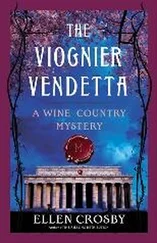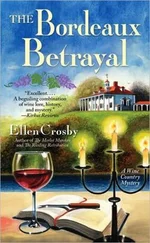A small pile of mail stuck out from behind a mantel photo of Fitz with his arm around Julia Child. I pulled out the papers and sat down on his leather sofa. His latest phone bill, the electric bill, and an invitation to an upcoming Musicfest summer concert in Leesburg.
The last item was a yellowing envelope on which the heavy impression of a key was visible. I lifted the flap and pulled out a note card, which bore the same key impression. Years ago my mother had reproduced a few of her watercolors of the house and the vineyard, turning them into note cards. She’d sold them at the winery or given them as gifts.
This painting—the original—hung in Leland’s office. The weather-etched tombstone of Hugh Montgomery, who had been one of Mosby’s Rangers, was in the foreground. The serene sun-dappled Blue Ridge floated in the distance. My mother had often gone to the cemetery to paint, saying there was something particularly special about the light there. She used to take me along for companionship, leaving me to read a book or explore the sun-warmed gravestones of my ancestors, memorizing the inscriptions on the markers while she worked.
The verse inside the note card was written in my mother’s graceful penmanship.
The purest treasure mortal times afford
Is spotless reputation; that away,
Men are but gilded loam or painted clay.
A jewel in a ten-times-barr’d-up chest
Is a bold spirit in a loyal breast.
Mine honor is my life; both grow in one;
Take honour from me, and my life is done.
Richard II, Act 1, Scene 1
Shakespeare. She loved Shakespeare. I knew the precise location on the bookshelf in her study where she kept her well-worn copy of his complete works.
I stared at the quote, unable to connect it with the key. Was the reference to “a jewel in a ten-times-barr’d-up chest” a hint about the location of the jewelry box where Fitz suspected the necklace was hidden? If it was, Fitz hadn’t found it—or perhaps he hadn’t had enough time to look. He’d said he’d only recently gone through her papers.
I slipped the card into the envelope and looked down at the fireplace hearth. Though it was summer, there were ashes in the grate. I moved the floral arrangement to get a better look. A fragment of a blue satin ribbon gleamed faintly among the charred papers. I poked the debris with tongs from a nearby stand. Other than the ribbon, all else was ash and cinder. He must have burned their correspondence, except for the envelope with the note containing the key—just like he’d wanted to do with her diaries.
I searched the rest of the cottage, leaving the bedroom suite for last. On his bedside table was a photograph of his parents. Next to it in a dime-store bright brass frame was a picture I’d never seen of Fitz and my mother. She was holding Mia, who was probably not more than a few months old. It was taken at the winery, in the courtyard loggia, probably in summer because a profusion of geraniums spilled out of a wine cask next to where they stood. Mia, completely toothless, grinned giddily, and Fitz and my mother looked radiant. I picked up the frame and slipped the photo out, holding it so the light from the bedside table lamp reflected off it.
A faint but unmistakable impression of a key. The photo had been in the envelope. Mia would have been too young to know why that picture held such special significance for my mother and anyone else who might know was dead.
I set it back on his nightstand and walked into the master bathroom. Fitz was taking enough medicine to keep a pharmacy in business. I recognized the drug Leland used to control his cholesterol and another to lower blood pressure, but it was the antidepressant that surprised me the most.
I closed the medicine cabinet and stared at my haunted reflection in his mirror. Alcohol and antidepressants. The worst combination in the world. How long had he been hiding the fact that he was depressed? Had Dominique known?
How could I have let him walk away from me last night?
I drove home and went directly to my parents’ bedroom and my mother’s dressing table. Her jewelry box, a family heirloom passed down through generations of Montgomery women, had originally belonged to Leland’s great-great-grandmother Iona. I found it where it had always been and wiped away the dust with the side of my fist. It was not locked and Fitz’s key didn’t fit the lock, either. I lifted the polished burled wood lid with its mother-of-pearl inlay surrounding the initials IEM.
Iona Esmé Montgomery’s velvet-lined jewelry box, which once held the Bessette family jewelry, was empty. Judging by that coat of dust, it had been that way for a long time.
I slept badly for a second night, despite the lingering effects of jet lag. When I woke the next morning I felt the same muddled lack of clarity I remembered from my days in the hospital, a nonrestful drug-induced slumber that, combined with the oppressive humidity, felt like someone had their foot on my chest. Downstairs a door slammed and I heard male voices.
I looked around the room, disoriented until memory clicked into place. I was home, not in France. I squinted at the alarm clock in the liquid gray light. Just after 5 A.M. Quinn said he was moving the winery operations over to the house today. He hadn’t wasted any time.
I got up and showered, changing into jeans and a black-and-white striped tank top. Quinn was in the dining room, pacing the floor, a mobile phone clamped to his ear, restless and seemingly impatient with whoever was on the other end of the line. Every time he passed the china cabinet, he picked up a different piece of my great-grandmother’s Limoges or her silver and studied it as he paced. He was still wearing the combat fatigues, but he’d swapped the Hawaiian shirt for a T-shirt with a Harley-Davidson logo on it. He hadn’t shaved, which made him look even scruffier than I remembered from yesterday. I went over and took a Sèvres bud vase out of his hand and set it back on the shelf. Then I went through to the kitchen.
I poured coffee and juice and made toast and slowly took everything out to the veranda on one of my mother’s hand-painted vintage Tole trays, my cane hooked over one arm. I sat on the stone wall at the edge of the veranda and looked out at the view.
Directly below me was a series of stepped-down terraces heavily planted with azaleas, rhododendrons, dogwood, and cherry trees. The vineyards were off to the north and south, where the terrain was gentler, and weren’t visible from here. Our property ended at a private gravel road that led to our neighbors’ stud farm. Their barns and the neat pastures outlined by split-rail fences, where a few horses grazed picturesquely, looked impeccable compared to the wilderness on our side of the road. Beyond their farm, the land rose gently again and became a forested ridge of deciduous trees that would turn flame-colored in autumn. Framing everything should have been the soft blue-gray layers of the Blue Ridge, but they had been whited out once again by the heat and humidity.
When people say “old as the hills” I’m sure they mean the Blue Ridge, which have existed since before the Himalayas came to be and were grandfather-old when the Alps erupted. Now they were worn to nubs, a smallish mountain range like a series of dowagers’ humps, just under five hundred miles long and not so wide you couldn’t hike across them in a day if you were determined.
The screen door banged behind me. Quinn sat down, coffee mug in hand, his legs dangling over the ledge. “I can borrow a few pieces of equipment from John Chappell over at Hogsback Mountain Winery.” He sipped his coffee. “When you see Eli, tell him I need to talk to him, will you? The motor on the destemmer’s broken. It’s going to cost eight hundred bucks, give or take, to get it fixed. I’ll need the money today.”
Читать дальше












